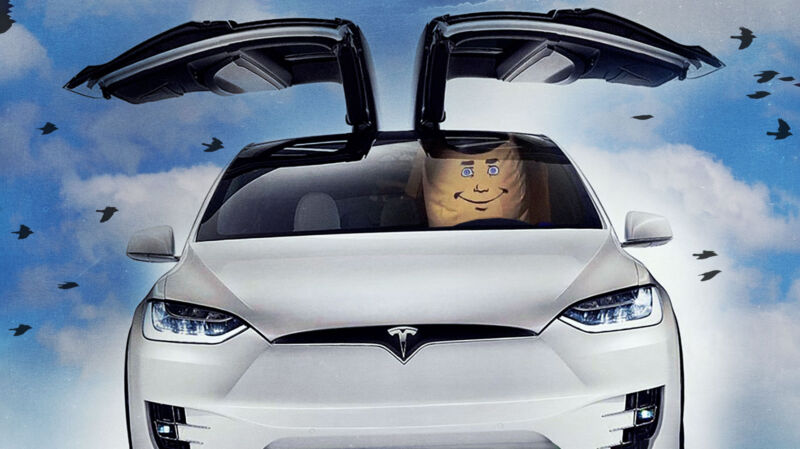
There's more bad news for Tesla. On Monday, we learned that CEO Elon Musk is continuing to slash his way through the company payroll as Tesla went through a fourth round of layoffs in four weeks. Yesterday, we discovered exactly what questions the National Highway Traffic Safety Administration wants answered about the safety of Tesla's Autopilot driver assist. And today, it emerged that the US Department of Justice is investigating whether or not Tesla committed securities or wire fraud by making misleading statements about Autopilot and its so-called "Full Self-Driving" (FSD) option.
Reuters reported that three people familiar with the matter told it about the investigation. One of the sources also told Reuters that the Securities and Exchange Commission is also investigating Tesla's claims about its driver assists.
Not the first time
This isn't the first time Tesla has been accused of securities fraud. In 2018, Musk agreed to a settlement with the SEC over his infamous "funding secured" tweet that sent the company's share price skyrocketing despite the fact that there was never actually a possibility that he would take the company private. As a result, Musk was required to step down as chairman, and both Musk and Tesla were ordered to pay $20 million in penalties, to be distributed to investors who lost money after being misled by Musk.
Advertisement(However, a federal jury in 2023 sided with the CEO in a class-action lawsuit brought by investors.)
In another case, several Tesla owners filed a class-action lawsuit against the car company about "grossly exaggerated" range claims, alleging fraud and false advertising. The judge in that case ruled that the customers could not sue Tesla as a class, telling them instead that they had to pursue their cases individually via arbitration. We learned last October that the DOJ was also investigating the matter.
(Authorities in South Korea fined Tesla $2.2 million in January 2023 for misleading customers about range.)
Federal prosecutors first became interested in "whether Tesla misled consumers, investors, and regulators by making unsupported claims about its driver assistance technology's capabilities" in 2022. Critics have regularly pointed out that even the name "Autopilot" is misleading, and there have been multiple instances of Musk demonstrating the system on camera without keeping his hands on the steering wheel, despite other Tesla literature that states drivers must do so at all times.
The CEO has also regularly claimed that Tesla is far ahead of the rest of the industry in autonomous driving technology, issuing deadlines for full autonomy that, like most of Musk's deadlines, have come and gone without delivering the product.
Yet a wrongful death lawsuit—settled out of court by Tesla in April, thereby avoiding a trial—revealed that a widely viewed Autopilot demonstration in 2016 was not only staged but that this deception was overseen by Musk himself, who wrote in an email, "I will be telling the world that this is what the car *will* be able to do, not that it can do this upon receipt."
In fact, the video never makes this clear at all. Instead, it opens with white text on a black background that tells the viewer, "The person in the driver's seat is only there for legal reasons. He is not doing anything. The car is driving itself."
Claims by Tesla that its Autosteer function reduced crashes by 40 percent—a stat uncritically touted by NHTSA for several years—fell apart in 2019 when an independent review found that the data actually showed that Autosteer increased crash rates by 59 percent.
Last year, a whistleblower leaked a trove of Tesla documents to the German publication Handlesblatt, which revealed, among other things, that Tesla maintained a team to divert customer complaints, particularly about its driver assists. The team had instructions to only communicate with customers about problems verbally instead of leaving a paper trail. The whistleblower has since said he leaked the documents because he saw "serious lapses" in Autopilot safety.
AdvertisementBoth Autopilot and FSD have been subject to massive recalls, most recently in December 2023, when Tesla had to recall more than 2 million cars to fix a number of flaws highlighted by NHTSA. But the regulator is not satisfied with that most recent recall and has demanded answers from Tesla about the cars it was applied to and the decision-making that occurred leading up to the recall.
“Balls to the wall”
However, the partially automated driving systems remain critically important to Tesla, particularly FSD. In April, the company dropped the price of this controversial option by $4,000, and Musk recently told his followers that "[g]oing balls to the wall for autonomy is a blindingly obvious move." As Tesla's profit margins and sales shrink, the revenue brought in by FSD is becoming increasingly important to the company's bottom line, even though not all of it can be recognized currently.
There is no guarantee that prosecutors will charge Tesla with fraud. Neither "puffery" nor "corporate optimism" counts as fraud, according to US courts, and the DOJ would need to prove that Tesla knew its claims were untrue. As we saw last year, relying on Musk's social media posts probably won't work, but the prosecutors have subpoenaed what Reuters described as "voluminous documents" from the automaker.
Although Tesla has no press office to call for comment, in its recently released 10-Q, it stated that "[t]o our knowledge, no government agency in any ongoing investigation has concluded that any wrongdoing occurred."



















